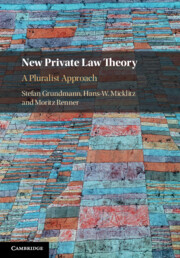Book contents
- New Private Law Theory
- New Private Law Theory
- Copyright page
- Contents
- Preface
- New Private Law Theory
- Part I Methods and Disciplines
- Part II Social Ordering, Constitutionalism and Private Law
- Part III Transactions and Risk: Private Law and the Market
- 11 Negotiation, the Function of Contract and the ‘Justice of Consensus’
- 12 Knowledge and Information
- 13 Private Power
- 14 Non-discrimination
- 15 Risk, Tort and Liability
- 16 Digital Architecture of Private Law Relations
- 17 Between Market and Hierarchy
- Part IV Persons and Organizations
- Part V Private Law (Rule-Setting) beyond the State
- Index
- References
17 - Between Market and Hierarchy
from Part III - Transactions and Risk: Private Law and the Market
Published online by Cambridge University Press: 09 April 2021
- New Private Law Theory
- New Private Law Theory
- Copyright page
- Contents
- Preface
- New Private Law Theory
- Part I Methods and Disciplines
- Part II Social Ordering, Constitutionalism and Private Law
- Part III Transactions and Risk: Private Law and the Market
- 11 Negotiation, the Function of Contract and the ‘Justice of Consensus’
- 12 Knowledge and Information
- 13 Private Power
- 14 Non-discrimination
- 15 Risk, Tort and Liability
- 16 Digital Architecture of Private Law Relations
- 17 Between Market and Hierarchy
- Part IV Persons and Organizations
- Part V Private Law (Rule-Setting) beyond the State
- Index
- References
Summary
Among the most revolutionary findings of twentieth-century contract theory is that the divergence between spot contracts – discrete agreements for immediate exchanges – and the long-term, co-operative contracts now generally called relations or relational contracts may be just as great as (or even greater than) the divergence between relational contracts and organizations such as companies. Relational contracts, moreover, are often situated in larger networks, that is, multi-party arrangements. Such contracts are, in practice, generally the basis of a stable organizational arrangement. Thus, rather than a single dichotomy between the market and firm forms (see Chapter 19 and Coase’s paper of 1937 – and more generally for the firm and its embeddedness, see Chapters 20–22), hybrids and intermediate solutions become a core issue of consideration, suggesting functional neighbourhoods that depart considerably from those suggested by the traditional legal categorizations.
- Type
- Chapter
- Information
- New Private Law TheoryA Pluralist Approach, pp. 315 - 338Publisher: Cambridge University PressPrint publication year: 2021

